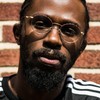As an early listener of Fool, that song was a celebratory moment. There are few feelings like witnessing an artist you've watched grow seize the opportunity of a lifetime; you can vicariously feel the joy of leveling up. Soon after that, Roc Nation announced that they’d signed the rapper to a record deal. Now, with fellow DMV artists like Rico Nasty and GoldLink making their push for mainstream, pop-leaning stardom, Q Da Fool has a real chance at being the go-to storyteller for what on-the-ground life can be just outside of The District.That summer afternoon in New York, the rapper born George Hundall rocked a grey striped kufi—his signature—a fitted black tee, grey sweats, and black Balenciaga sneakers. Right under his bottom lip was a tattoo that read “FOOL.” With him was Dolla, a tall, quiet, and clean-cut dude covered in tats who runs their label, Rich Shootas, and regularly pops up on Fool's social media accounts. “I’m learning not to give them too much,” Fool said in a textbook Maryland slur as we walked through the office. Since his signing, he’s scaled back on his impulse to drop songs at any given time, only releasing a few loose ones including high energy single “Straight” and “The Plug” a career-defining track produced by Zaytoven. “I used to always be geeked, like ‘The fans want more!’ But even when you give them more, they still gon’ ask for more.” For the first time in his short career, he’s learning how to selectively pace himself without the fear of falling out of people’s consciousness.“Two years ago, I never thought I’d do no songs with these niggas. Not ‘cause they too big—I just didn’t even think it was possible because I was a regular street nigga. Who the fuck wanna do a song with a street nigga?"
Q Da Fool with his friend and president of their Rich Shootas label, Dolla.
Q Da Fool’s story is one that’s still largely about reversing former transgressions, especially now that he has a chance at actually breaking out of his hometown. On social media, he projects an easy-going vision of newfound stardom. He’s laid back, hilariously playful with friends, and extremely focused for a 21-year-old. He, as noted, smiles a lot. Just last month, a funny video of Fool having a playful argument with a New Yorker while advocating for Maryland (“the nation of crabs” he fervently added) being the leading area of the East Coast, provided laughs to the DMV corner of the internet. That side comes through in fits and starts during our afternoon together—when more of his friends showed up at the office, he instantly went from reserved artist to joke-cracking guy happy to be away from home for a few days—but he was also a little more subdued, a little more hesitant, the sign of someone who isn’t quite comfortable in inherently awkward press situations just yet. You have to imagine that he will be soon.“I didn’t even really get confident until I was inspired by Q Da Fool. I had seen him in school. Then he was in and out of jail. When I reconnected with him, we did a song and he just inspired me because he was just real. It made me feel like, damn 'I can really be myself and people gonna respect that.' He’ll rap in front of everybody, any camera. He really got that shit—his fearlessness.”- Rico Nasty
